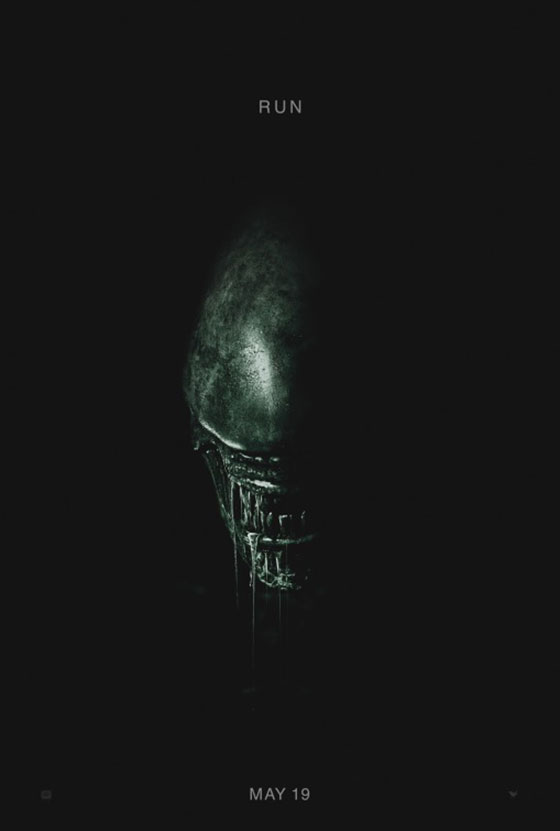Stars: Katherine Waterston, Michael Fassbender, Billy Crudup, Danny McBride, Guy Pearce | Written by John Logan, Dante Harper | Directed by Ridley Scott

After 2012’s Prometheus, Ridley Scott returns to the scene of the Alien prequel crime, and he’s on viscera clean-up detail: Covenant is another lead-into the 1979 classic, but it presses the reset button in many ways. So, we get some of Prometheus’s philosophical content, but also a return of the grungy ‘70s low-tech aesthetic, and more straightforward horror movie thrills.
After an intriguing prologue featuring a younger Weyland (Guy Pearce) and a proto-David (Michael Fassbender) – creator and creation – we are aboard the Covenant, a colony ship en route to seed a distant planet named Origae-6. Following a neutrino burst which damages the solar sails, the resident android Walter (Michael Fassbender) wakes the crew from cryo.
Newly-promoted Captain Oram (Billy Crudup) gets his people back to work and fixing the ship. Suddenly, they receive a message from an unknown world. A habitable world. Rather than enduring the ten-year voyage to Origae-6, Oram elects to take his ailing crew – and the 2000 colonists in the hold – to this promising new planet.
First mate Daniels (Katherine Waterston) advises against the detour, but her protests fall on deaf ears. Suffice to say, they should have listened to her. What the Covenant crew discovers on the surface comes as a nasty surprise to them (although less so to us, of course). There are spores. There’s splat-gore and body horror. And there’s an urbane local resident, who happens to be a mad scientist.
Straight away there’s a slightly wearying sense of got-the-t-shirt about landing on yet another planet for yet another first encounter. But hey, there’s joy in repetition, and at least Alien: Covenant corrects one of the central issues of Prometheus by portraying a science team with a basic semblance of professionalism. Indeed, the reason Covenant is a better film than Prometheus is because of the screenplay. Characters are consistent and their motivations are generally clear, even if several yawning “whys” will haunt you as the credits roll.
Technically, it’s an efficiently-crafted movie made by a veteran director capable of making it look effortless. Up until the CG carnival of the final act, the action is well-handled and skilfully portrays chaos and confusion without leaving us chaotically confused about what is happening to whom. The deaths are satisfyingly gory and gloopy, and the zoologically inclined will delight in the range of Alien forms. But we’re basically mimicking the beats of previous instalments, from the Alien POV shots of David Fincher’s film, through the experiments-gone-wrong of Resurrection, to a final fight which comes across like a mashup of the first two films’ finales. Unlike the earlier movies, however, we do get a pleasingly nasty horror movie gut-punch in the final moments.
Scott draws very good performances from the main cast. Waterston’s Daniels is more engaging and sympathetic than Noomi Rapace’s Shaw. Thrust into grief early on, Daniels’ behaviour – her caution – is always tinged with puppy-eyed loss. She’s understandably anxious, and later on understandably angry. She’s no Ripley, but she’s also no damsel. Danny McBride, as Tennessee, is a revelation mostly because he’s not the comic relief we expected, and he is legitimately heroic. Then there’s Michael Fassbender, who does much of the story’s thematic heavy-lifting. His new ‘droid, Walter, has supposedly been shorn of the wayward human traits which, ironically, turned his predecessor David against his creators. But Walter’s loyalty will be tested.
While the hybrid of high-minded monologuing and visceral genre thrills dovetail somewhat better this time around, we’re still left with The Prometheus Problem. By which I mean, the very elements that made the first two Alien movies work so well – the tri-force of simplicity, mystery and implicitness – are by design incompatible with Scott’s opened-up, everything-explained update. The need to satisfy questions no one asked about the origin of the species means that, while we get some genuinely interesting intellectual encounters in Alien: Covenant’s second act, such scenes take up considerable narrative real estate. As such, Scott doesn’t get the luxury of gradually establishing the environment (i.e. building atmosphere) or carefully constructing setpieces (i.e. building tension).
Therefore, as with Prometheus (albeit to a lesser extent), we’re not so much watching dramatic events unfold as observing a narrative contort, tying itself in knots as it tries to couch creationist concerns in a high-grade genre movie. As we watch these thematic gymnastics play out, one must eventually ask: Would it not have been easier to simply tell this story in a different universe? Alas, that wouldn’t be congruent with the businessman in Sir Ridley, who has made no secret of his jealous desire to open up the Alien universe like Star Wars, regardless of whether this is a can of facehuggers worth opening.
So, the 30-year wait for another great Alien movie continues; but Alien: Covenant still belongs in the second tier, alongside Alien 3. Which is fine. If you found Prometheus unbearably silly and overreaching, this deluxe model won’t change your mind, but you will find some of your concerns are addressed. The course is set for the future of Ridley Scott’s precious chestburster, and Covenant is a franchise filler that does no harm, whilst also doing nothing special.
Alien: Covenant is in cinemas now.